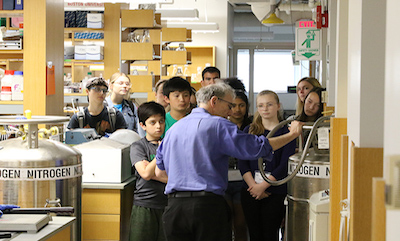New PHX Program Introduces Public Health to Youth.

The next generation of doctors, marine biologists, nutritionists, and researchers jump-started their careers during Population Health Exchange’s inaugural PopHealthExperience youth enrichment program at the School of Public Health June 24–28.
The immersive summer program introduced rising 7th through 10th grade Boston-area students to the foundations of public health, with an emphasis on biostatistics, epidemiology, and environmental health.
“It’s been a dream of ours to offer a program for younger students who may not have had any exposure to population health,” said Leslie Tellalian, director of lifelong learning. “We chose this age group because there was a lot of opportunity to offer hands-on activities that are academic, but still interesting and fun, during the summer.”
Organized by Francisco Patino, PHX administration and finance manager, along with Abbigayle Monssen and Catherine Stever, both MPH students and PHX interns, the program featured interactive workshops that equipped students with the technical and analytical skills needed to solve public health problems. The group learned to identify, frame, and shape public health issues and policies in sessions led by Sophie Godley, clinical assistant professor of community health sciences, and Harold Cox, associate dean for public health practice. They also honed skills in epidemiology study design with Meagan Healey, clinical assistant professor of epidemiology, and data interpretation and visualization using JMP statistical software with Lisa Sullivan, associate dean for education.
The students also had an opportunity to observe real-world data. David Sherr, professor of environmental health, guided them on a tour of his laboratory in the Department of Environmental Health, where they viewed liquid nitrogen tanks and freezers of tissue cultures, and even inspected cancer cells under a microscope.
“The reason this tissue culture room is off to the side is because we have to limit the flow of bacteria that are all around us,” Sherr said. “We’re breathing in bacteria and fungi all the time—but we don’t die from it because our immune system is always on the prowl.
“It’s nothing to sneeze at,” he quipped.
The students also examined issues of environmental and social justice during a walking tour of the South End, led by Erica Walker, postdoctoral associate in the Department of Environmental Health and founder of the Community Noise Lab. From the Medical Campus to Dudley Square, the students used a noise meter to measure and compare sound levels and quality at different street corners, and then discussed how sound can impact the health of different communities.
Pointing out the cacophonous clanging of construction work and public transportation rumblings on certain streets—versus the dulcet sounds of public fountains and chirping birds on others—Walker explained how unpleasant sound, known as noise, often disproportionately affects lower-income and minority neighborhoods. “The sound level here permeates people’s apartments, and they’re really bothered by that,” she said, as a bus zoomed by the corner of Washington Street and Ruggles Street.
Putting their public health knowledge to the test, the students were tasked with developing a program or policy solution to a public health issue of their choice by the end of the week. On Friday, June 28, with their parents and members of the SPH community in attendance, student teams presented evidence-based policies or program ideas that addressed substance use disorder, vaping, homelessness, and overprescribing of antibiotics.
“I’m really glad I got to conduct research and collect data, and learn about different public health issues,” said Alina Maier, 14, a rising 9th grade student at Belmont High School. Her group found that the number of liquor stores in a neighborhood was associated with the percentage of residents who were binge drinkers. The team proposed that these districts expand recovery programs and reduce the availability of liquor in the area to mitigate the dangerous health and economic effects of binge drinking. Maier, who is interested in pursuing a career in science, said “the program helped me get a handle on what I want to do, so that I’ll be prepared by the time I get to college.”
“I’ve had the privilege this past week of having a conversation with the future—and I’m pleased to report that think we’re in very good hands,” Patino said to the students after the presentations. “I hope that you will take the public health frameworks, social justice frameworks, and everything else that you learned this week wherever you go, as you make your communities a better place.”